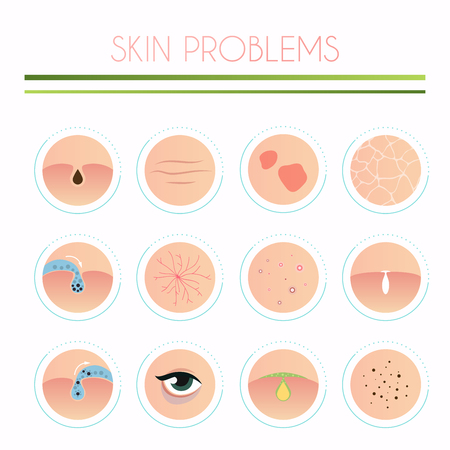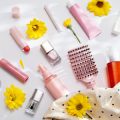Understanding Hormones in Your 20s
Your twenties are a time of big transitions—and your skin definitely feels it. Hormonal changes are at the heart of this, with estrogen, progesterone, and testosterone levels shifting as you move through college life, new jobs, relationships, and changing routines. Estrogen is known for helping skin stay plump and hydrated, while progesterone can make your skin oilier or even trigger breakouts around your menstrual cycle. Testosterone, which both men and women have (just in different amounts), can also boost oil production and lead to acne flare-ups. The hormonal rollercoaster during this decade means your skin might feel unpredictable—sometimes glowing, sometimes breaking out, and other times feeling dry or sensitive. Understanding these natural hormone fluctuations gives you the power to better care for your skin and helps you realize you’re not alone if things seem a little out of control sometimes.
Common Skin Issues Linked to Hormones
When you hit your 20s, it can feel like your skin has a mind of its own. While you might have hoped to leave breakouts behind in high school, the reality is that hormonal changes continue to impact your complexion well into adulthood. Let’s break down some of the most common hormone-driven skin problems people in their twenties face and how these are connected to shifting hormone levels.
Typical Skin Problems in Your 20s
| Skin Issue | Description | Hormonal Connection |
|---|---|---|
| Adult Acne | Pimples, blackheads, and cystic spots showing up on your face, jawline, or even back | Fluctuations in androgens (like testosterone) boost oil production and clog pores |
| Oiliness | A shiny T-zone or greasy feeling by midday, even after cleansing | Increased sebum from hormonal spikes—often around periods or due to birth control changes |
| Dryness | Tightness, flakiness, or rough patches that don’t improve with moisturizer alone | Estrogen dips can decrease your skin’s natural moisture retention, especially during stressful times |
| Sensitivity | Redness, itching, stinging, or reacting more than usual to products | Hormonal shifts disrupt the skin barrier and immune response, making skin prone to irritation |
| Delayed Healing | Cuts, blemishes, or irritations take longer than normal to disappear | Cortisol (the stress hormone) can slow down cell turnover and recovery processes |
The Science Behind It All
Your hormones act as internal messengers that help regulate everything from sleep to metabolism—and yes, your skin health too. During your 20s, you might be juggling college stress, new jobs, relationship ups and downs, and lifestyle changes. Each of these factors can trigger hormone fluctuations. For example, increased stress releases cortisol, which not only affects healing but can also ramp up oil production. Similarly, changes in birth control or monthly cycles play a big role in the appearance and feel of your skin.
Why This Matters for You
If you’re noticing new breakouts or unpredictable skin patterns in your twenties, you’re definitely not alone. Understanding that hormones are a key part of the equation helps demystify what’s happening—and sets you up for smarter self-care strategies moving forward.

3. Lifestyle Factors That Make a Difference
Your 20s are a whirlwind of new experiences, responsibilities, and self-discovery—but all this excitement can also bring plenty of stressors that impact your skin. In the U.S., young adults juggle busy college schedules, early career pressures, social lives, and sometimes even family planning. These lifestyle factors interact with your hormones in ways that can really show up on your face—literally.
Stress: The Silent Skin Saboteur
Let’s start with stress. Whether you’re cramming for finals or hustling at your first job, chronic stress triggers a surge in cortisol (the “stress hormone”), which can ramp up oil production and lead to breakouts or flare-ups of conditions like eczema and psoriasis. Learning coping techniques—think mindfulness, yoga, or even just carving out downtime—can help keep both stress levels and your skin in check.
Sleep: Your Skin’s Reset Button
Late nights and irregular sleep patterns? We’ve all been there. But skimping on sleep throws off your hormonal balance and impacts your skin’s ability to repair itself overnight. Aim for 7-9 hours when possible—your body (and your complexion) will thank you.
Diet: More Than Just Calories
What you eat fuels every cell in your body, including those that make up your skin. High-glycemic diets common in the U.S.—think processed snacks, sugary drinks, and fast food—can spike insulin and worsen acne. Balancing meals with whole grains, lean proteins, healthy fats, and plenty of fruits and veggies helps stabilize blood sugar and support clear skin.
Birth Control Choices: Not One-Size-Fits-All
If you use hormonal birth control, it can have a big impact on your skin. Some options (like certain oral contraceptives) can actually help balance hormones and reduce acne, while others may worsen it for some people. It’s important to talk with a healthcare provider about what works best for your unique body and skin goals.
The Takeaway
No single lifestyle tweak is a magic fix—but being aware of how stress management, good sleep hygiene, balanced nutrition, and informed birth control choices intersect with your hormones gives you more control over your 20s skincare journey. Small changes can add up to big results!
4. Smart Skincare Tips for Your 20s
Your 20s are the perfect time to set the foundation for lifelong healthy skin, especially as hormones can be unpredictable. While breakouts and oiliness might still pop up (thanks, hormones!), a smart, consistent routine can make all the difference. Here’s how you can keep your skin happy and resilient—no matter what your hormones are up to.
Keep It Gentle
It’s tempting to go all-in on strong exfoliants or acne-fighting products, but overdoing it can actually strip your skin’s natural barrier. Dermatologists recommend choosing gentle cleansers and avoiding harsh scrubs or alcohol-based toners. Look for fragrance-free options that won’t trigger irritation.
SPF: Non-Negotiable
If there’s one skincare rule everyone in their 20s should live by, it’s daily sunscreen use—even if you’re inside most of the day. UV damage is cumulative and can sneak up on you, so opt for broad-spectrum SPF 30 or higher every morning. Here’s a quick guide:
| Skin Type | Best SPF Formula |
|---|---|
| Oily/Acne-Prone | Gel-based, oil-free, non-comedogenic SPF |
| Dry/Sensitive | Cream-based, mineral SPF with zinc oxide or titanium dioxide |
| Combination/Normal | Lightweight lotion or fluid SPF |
Moisturize With Purpose
Your skin’s moisture needs might change during your cycle or due to lifestyle factors. Pick a moisturizer that suits your current skin mood—lighter gels for oily days, richer creams when feeling dry. Ingredients like hyaluronic acid and ceramides help reinforce your skin barrier without clogging pores.
Treat Acne Wisely
If hormonal acne shows up, don’t panic! Spot-treat with benzoyl peroxide or salicylic acid, but avoid slathering these ingredients all over unless recommended by a dermatologist. For persistent issues, consider consulting a pro about prescription options tailored to your hormonal patterns.
Avoid Overdoing It
Sometimes less really is more. Resist the urge to pile on multiple actives (like retinoids, acids, and vitamin C) all at once; this can irritate your skin and worsen breakouts. Stick to a simple routine you’ll actually follow—and give your products time to work before switching things up.
5. When to Seek Professional Help
While many hormonal skin changes in your 20s are totally normal, it’s important to recognize when something feels off and might need a professional’s touch. If you notice persistent or severe acne that doesn’t respond to over-the-counter treatments, sudden changes in your skin texture or color, or symptoms like excessive hair growth, hair loss, or irregular periods alongside your skin issues, it could signal a deeper hormonal imbalance. Don’t brush off red flags like painful cystic acne, rapid-onset rashes, or signs of infection (like pus, swelling, or fever). In these cases, booking an appointment with a dermatologist is a smart move—they can offer tailored treatments and rule out underlying conditions like PCOS or thyroid disorders. If you’re unsure whether your skin concerns are “serious enough,” remember: there’s no shame in advocating for yourself and seeking expert advice. Your skin is unique, and sometimes over-the-counter fixes just aren’t enough. A healthcare provider can help you get to the root cause and set you on a path toward clearer, healthier skin.
Empowering Your Skin Journey
No two skin stories are exactly the same—and that’s something to celebrate. Embracing your unique skin, with all its quirks and changes during your 20s, is a powerful act of self-love. Hormonal shifts can sometimes feel overwhelming, but remember: your skin doesn’t have to fit a single standard of beauty. It’s okay if you don’t have flawless skin every day or if your journey looks different from your friends’.
Embrace Your Individuality
Your skin is as individual as your personality. The way hormones affect you—whether it’s through breakouts, oiliness, dryness, or sensitivity—is part of what makes you, you. Instead of comparing yourself to others or social media ideals, focus on what helps you feel confident and comfortable in your own skin.
Celebrate Progress Over Perfection
Skin care isn’t about achieving perfection; it’s about progress and self-care. Some days will be better than others, and that’s perfectly normal. Take time to appreciate the small wins—like finding a moisturizer that works for you or noticing fewer breakouts after making a lifestyle change.
Your Story Matters
Whether you’re dealing with hormonal acne, learning how to manage stress, or figuring out which products help you glow, your experience is valid. Don’t be afraid to seek support—from dermatologists, friends, or online communities—when you need it. Sharing stories and tips can empower everyone on their unique skin journey.
Above all, give yourself grace. Your 20s are a time for growth, change, and discovering what works best for you. Honor where you are right now and trust that with time and care, your skin will reflect your commitment to yourself.


